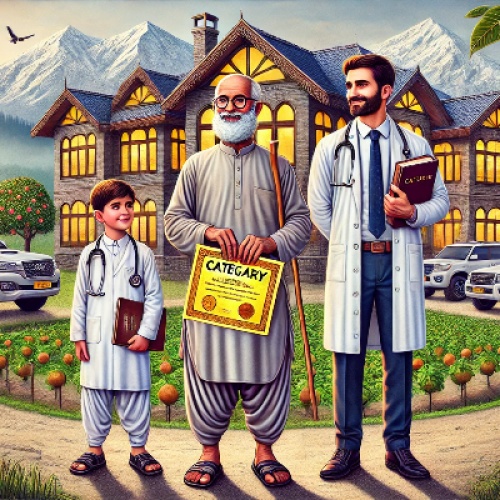This piece of paper was more revered in Shaban's home than the sacred kangri on a frosty winter morning. His grandmother would often say, "Ye category cha Khuday-e-Sund Dun" (This category is God's blessing).
Even as a child, Shaban was told that he was special. His father, a government school teacher, would often pat him on the head with a sense of pride, a steaming cup of nun chai in hand, and say, "Ase chu Nachvis Wade Kurmut Ye Banawon Doctor" (We've promised our son we'll make him a doctor). Shaban's father had been selected for his teaching job through the same category certificate, a fact he took immense pride in. This document, he often said, was the key to unlocking a better life.
Despite the family's modest image, they were far from poor. They owned lush agricultural lands stretching across the fertile outskirts of Srinagar, where groves of almond, walnut, and apple trees flourished. The lands yielded enough not only to feed the family but also to generate a steady income. The family's granaries were always stocked with rice, maize, and saffron, while their cows provided a generous milk supply. Their financial stability was evident in their well-maintained home with carved wooden ceilings (khatamband) and a sprawling kitchen garden.
Yet, the category certificate remained their most prized possession. For them, it symbolized not just opportunity but an unshakeable belief that Shaban's future was secured, no matter how competitive the world became. For his family, Shaban wasn't just a child; he was their golden tulip (Yemberzal), destined to shine brighter with every step he took.
The Golden Ticket:
With his middling grades and carefree demeanor, Shaban never matched the intensity of his classmates, Hamid and Shabir, who spent their evenings buried in books. While they slogged and poured over NEET prep books until their eyes burned, Shaban enjoyed his long strolls by the Dal Lake, munching on kulchas and sipping noon chai.
"Asy Kya Parvay, Ase che category! (Why worry? We have categories!)" he'd reassure his panicked friends as exam day approached.
When the NEET results were announced, Shaban's family sat around the local newspaper like it was a divine revelation. And then - lo and behold - Shaban's name was there, shining brightly under one of the categories. The room erupted in celebrations. His mother almost spilled the samovar in her excitement.
"Shaban wichi Delhi, Ye Wichi Duniya," she declared, tears of joy streaming down her cheeks. (Shaban will see Delhi, he'll see the world!)
Hamid and Shabir barely made it to private colleges despite their months of hard work, while Shaban, thanks to his golden ticket, sauntered into one of the top government medical colleges in Delhi.
The Wazwan of Success
A few years later, Shaban returned to his hamlet as Dr. Shaban, the pride of his mohalla. He was welcomed with fanfare usually reserved for newlyweds or political candidates. Wazwan was legendary: Rogan Josh, Gushtaba, yakhni, and even rare delights like Tabak Maaz were served.
"Wazwanas chu Mazee Balayee Yene Ye Doctor Banayoo," an elderly uncle whispered, staring at Shaban's crisp white coat. (The Wazwan tastes even better when there's a doctor in the family.)
But Shaban wasn't done yet. He needed to secure a PG seat, and the category card again rescued him. While his peers burnt the midnight oil revising endless notes, Shaban spent his evenings reclining by the Bukhaari, sipping steaming nun chai, and gazing at the snow-capped peaks outside his window.
When the results came in, Shaban's family erupted once again. His father folded his hands in prayer and said, "Shukur Khudyas Kun Certificate-as chu Sifa." (Thank God! These categories are divine.)
From Hamlets to Hamams
With his PG degree in hand and a government job secured, Dr. Shaban quickly ascended the social ladder. He moved his family to a luxurious bungalow in Srinagar's poshest locality, with a sprawling walnut orchard and an elaborate hamam. The house was a marvel - chandeliers from Murano glass, central heating that could make even the harshest winter bearable, and a fleet of SUVs that turned heads wherever they went.
Shaban's Instagram became the talk of the valley. One day, he was skiing in the Swiss Alps; the next, he lounged by the Maldives' turquoise waters. His captions always read: Shukriya Khuda, we made it!
Meanwhile, his children, Arman and Areeba, grew up in unparalleled luxury. They attended the valley's most elite school, dressed in the finest brands, and carried designer backpacks worth more than a shikara. While other kids struggled with borrowed textbooks, Arman and Areeba had private tutors and every conceivable resource.
Act 4: The Circle of Privilege
Years passed, and it was now Arman's turn to shine. When the time for his NEET exam came, Arman wasn't the least bit worried. One day, as his cousin frantically revised his syllabus, Arman stretched lazily and said, "Ase Kya Parvay, Ase Banav Doctor, Ase Che Category" (Why worry? I'll become a doctor; we have the category).
As expected, Arman breezed through the entrance process, securing a seat in another prestigious medical college. The cycle repeated itself for his PG and job placements, and the family's category card continued to work its magic.
"Lukh Che Mainat Karan, Ase Che Khudayan Thavmich Category," Arman joked at a family gathering, much to everyone's laughter. (People work hard; God has kept a special category for us.)
Act 5: The Gossip at Hazratbal
The story of Dr. Shaban and his family became a local legend. During Eid-e-Milad at Dargah Hazratbal, neighbors gathered over Kehwa and gossiped about the family.
"Dr. Shaban Sebas Baye Temsindan Gharkan Aasiy Jennat-as Gasnas Te Category," an elderly man chuckled. (Dr. Shaban's family's path to paradise is through their category.)
"Ye Hay Ye Category Ase Te Bagrawhaan," another added. (They should share their category blessings with others, too!)
Even as Shaban performed his wudu at the Dargah, the water seemed to ripple with laughter, as if the universe found the story amusing.
Moral of the Story: The Privileged-Unprivileged Paradox
The tale of Dr. Privilege of Paradise doesn't just end with a few laughs over Kehwa. It raises an important question, one that echoed even among the saffron fields and the walnut groves of Kashmir:
If a category is meant to uplift the underprivileged, why is it passed down to those no longer underprivileged?
Think about it: the moment Shaban moved into his luxury bungalow with chandeliers from Italy, SUVs bigger than Shikaras, and a hamam so warm it could melt the snow outside, could he still call himself "underprivileged"? And yet, his family continued to play the category card like a trump card in a Kashmiri card game.
Here's the irony - every time a privileged unprivileged (like Shaban or Arman) secures a seat, an actual underprivileged student loses their chance. Somewhere in a small hamlet, a Hamid or Shabir is burning the midnight oil under a dim kangri's light, dreaming of becoming a doctor but losing their spot to someone who no longer needs the privilege of a category but still uses it.
It's like serving Wazwan at a party. When the real hungry guests are about to dig in, the already full guests swoop in for seconds. The privileged- unprivileged keep taking and taking, while the genuinely underprivileged are left with scraps - or worse, nothing.
So, the story's moral is loud and clear: when the category is repeatedly handed to the same families who've already "made it," it defeats its purpose. It's like lighting a kangri in summer - wasteful and unnecessary!
Let the category serve its true purpose: to uplift those still waiting for their chance, not to let it snowball into dynasties of "privileged-unprivileged" families living lives of luxury. In contrast, others remain stuck in the cold. Otherwise, we're not just heating the Hamams of the privileged - we're extinguishing the hopes of the truly deserving.
And as the elders of the valley might say with a knowing smile:
(Categories should help the poor bloom like tulips, not create tulip gardens for the already rich.)
Disclaimer:
The character of Dr. Shaban and the events in the story are purely fictional and created for humor and satire. Any resemblance to actual persons, living or deceased, or real-life situations is coincidental and unintentional. The story is intended to provoke thought and spark conversations about societal systems in a lighthearted manner.







